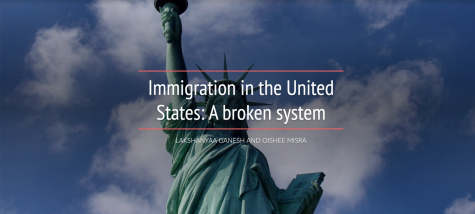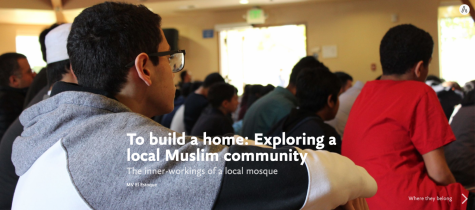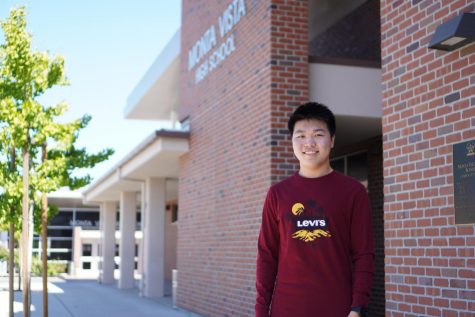El Estoque: Behind the story
Unpacking El Estoque student journalists’ reporting process on story favorites
November 25, 2019
El Estoque opinion editors junior Oishee Misra and senior Lakshanyaa Ganesh walk through a bustling San Francisco street before abruptly stopping in the middle of a crosswalk. They stare down at their phones in shock. They had published an El Estoque story on Oct. 26 titled “Immigration in the United States: A broken system”, centered around problems with the U.S. legal immigration system. In days, it had gained over two thousand views and garnered the attention of a lawyer actively working to pass legislation and improve the immigration system.
For some journalists, this recognition and affected change is the very reason they pursue journalism: to inform readers and incite responses to the issues society currently faces. El Estoque managing editor and senior Shuvi Jha helped lead her features section to pursue one of their favorite multimedia packages — exploring the local Muslim community, despite the many risks of not having a cohesive story to report on. Many El Estoque student reporters have specific stories they are particularly proud of, and the reporters of two such stories have shared their reporting process and thoughts about their best work.
Uncovering the flaws in legal immigration
Throughout Ganesh’s college search and application process, she has been constantly reminded of one thing: her parents’ work visas, which have led to her own dependent visa status. She shares that though many of her classmates complete forms requiring Social Security numbers without thinking much about it, this is just one example of a privilege that she doesn’t have due to her immigrant status. Misra shares that students like Ganesh must pay higher international application fees when applying to college despite residing in America and may even be required to take the Test of English as a Foreign Language (TOEFL), which is designed to test international students about their English proficiency.
Motivated by these numerous disadvantages, Ganesh and Misra decided to spread awareness about the issue of legal immigration, which they feel is not often discussed in the MVHS community. While researching for their story, Ganesh came across evidence which suggested the issue was even more prominent than she initially thought.
“The sheer amount of time that people have to wait for green cards really shocked me,” Ganesh said. “I watched this one video where John Oliver did a whole segment on legal immigration and how it works. He was talking about the Green Card backlog system and they interviewed a random Indian kid, and they [asked], ‘Did you know that your father might not get a Green Card until he turns 80 [years old]?’ and he was like, ‘Then what’s the point?’ When I found that and when I saw that it just hit really close, because I didn’t realize the extent of the issue until I saw that.”
Misra also became more aware of her own circumstances as she wrote her column in the immigration article. Previously, she had known that her status as an American was uncertain, but she had never researched or thought about the topic in depth. While writing her column, Misra realized that the future of her citizenship and visa status was in her own hands and her parents wouldn’t be able to provide everything for her. As a result, Misra’s began acknowledging her responsibility of educating herself about her own visa and immigration situation and learning to adapt to it.
When Ganesh and Misra finished their article, Ganesh found a Twitter thread discussing the topic. Ganesh replied to a lawyer and pasted the link to her El Estoque article, expanding its audience to a community outside of MVHS. Within days, their article received thousands of views and the lawyer replied to them, announcing he was taking action to alleviate the very issue. Yet despite the attention they received, both Ganesh and Misra agree that gaining popularity was never their primary goal.
“Our main goal writing [the article] was to let other people know, first of all, what the issue was, but also, [for] the people who face the same issues as us — we just wanted to let them know that they’re not alone,” Ganesh said. “It’s an issue that affects more people than you think, and that was just our main goal going out of it. So if we achieve that, then I’m happy.”
In writing the story, Ganesh felt that combining research of problems affecting others with her own personal experience gave her a very unique opportunity to develop her journalistic skills. Because of the effort she put in and the response she received, this is her favorite story she has written for El Estoque so far. Misra also believes she gained a lot from writing the article, as it expanded her perception of the role of student journalism.
“I always viewed El Estoque as me practicing and just something I do for fun,” Misra said. “But I think this made me realize that, as student journalists, we do also have some sort of power to instigate change. Before, I did [journalism] more for myself … but now I think it made me realize that it’s also for the people that are reading it.”
Revealing the truth of the Muslim community
Midway through April of this year, Jha and El Estoque managing editor and senior Swara Tewari made a last-minute decision: they abandoned all of their anticipated stories and interviews they planned for a multimedia package about college admission scandals. Instead, the features section took a trip to a local mosque to cover the reality of the Muslim community in the Bay Area, in light of the New Zealand mosque shooting.
“We just decided that none of us were enjoying the story whatsoever,” Jha said. “And if we’re not even enjoying the stories, if we don’t feel there’s purpose [in] writing it, then why would we expect our audience to read it themselves? It’s not even that we felt that the college admission scandal was not as important. It was that this was our last cycle as features editors and we wanted to do right by the community, right by both the MVHS community and the Muslim community that had been impacted by this.”
When they entered a local mosque, Jha and her section members did not have much of a plan. They knew there would be many risks with their spontaneous change of plans — even within the Muslim community, there were many different views, according to Jha. Even more importantly, they had no way of knowing how others would react to their presence.
“There would be some backlash of us just going in there, especially during Fridays, which was when they have their prayers,” Jha said. “And the fact that we [would] go there without a lot of announcement at all, just a bunch of high schoolers who very much look out of place — I knew that would pose a risk. I did not know if people [would] want to talk to us. I did not know what our stories would even be. Me and Swara told everyone there, ‘Get as many pictures as you can, get as many recordings as you can, just ask people anything.’ We didn’t have a story outline. We didn’t know what we were going to do.”
However, Jha found that not having a strict set of story angles to report on gave her section a lot of freedom to tailor their stories to the conversations and interviews they had. Initially, the features section planned to highlight the Muslim community’s disappointment, and expected many emotionally turbulent stories to come from their visit. However, they completely disregarded their initial assumptions when they began to engage in genuine conversation.
“By allowing all the sources to pave their own conversation and say whatever they want, we were able to create angles based off of their individual experiences,” Jha said. “As a result, each angle was very unique … And I think through that we learned that the story of the Muslim people is not a story of despair and depression, as we had previously thought … It’s a story of strength and of hope. And although the risks were high, I’m glad that it worked out, and that we were able to highlight this very important story of strength and perseverence that the Muslim community displayed to us.”
In writing the story with her section, Jha had never intended to directly impact the Muslim community. Instead, she wanted to show the MVHS community the reality of other communities they might not have much interaction with — she hoped to give them a realistic view free of biases that may be present in mass media.
“I just wanted to tell their stories, and at the end of [the] day, that’s what we’re here to do,” Jha said. “We’re not superheroes. The things that we write, it’s not going to solve their problems. I think it’s a little bit ridiculous to think that. What you’re doing is you’re communicating people’s stories in hopes that your audience will feel motivated to address those problems themselves. And by writing the story, I just wanted to do good by the community and maybe open ears and eyes in our school itself and see if it produces change in their perspective or not.”
Throughout the process of reporting for the package, Jha learned several lessons she continues to keep in mind. Her biggest takeaway from the experience was to take risks. Jha shares that failure is not necessarily a bad thing — instead, it’s simply a lesson and a stepping stone. Failing to meet deadlines or having a story cut from publication are okay if they lead to a new lesson learned or a story a writer believes is truly worth telling, according to Jha. Additionally, Jha learned a valuable lesson to trust her staff.
“Another thing that I learned from this whole experience was really trusting not only my section editor Swara, but also trusting the new people,” Jha said. “Going in, I was very apprehensive about certain members just not knowing how to ask the right questions … But then I was very impressed by the way that they took upon the conversations on their own. And so that trust, showing people respect and respecting their experience, regardless of where they might be and what level they might be at — it was very important.”
Jha firmly believes that such an experience was an example of some of the best journalistic work she has done. She felt satisfied with the way her story concluded her year of journalistic work in the 2018-19 school year and continues to look for stories which allow her to stretch her abilities as a storyteller.
“This was the last article that I did as a features editor, Jha said. “I think it embodied a lot of things that I want to see happen in my section which was just to show the important stories. It is the stories that people don’t think about and the ideas that people try not to think about, actively try not to bring upon in their minds and ponder upon — these are the stories that I as a Features editor want to tackle … And it was just a very, very important story for me, probably one of my proudest stories I’ve ever done.”





























